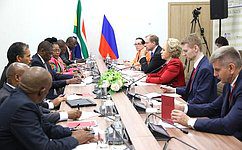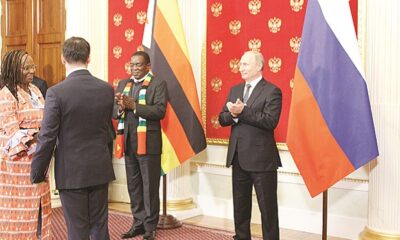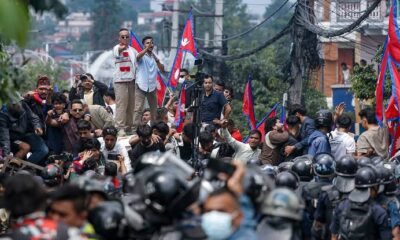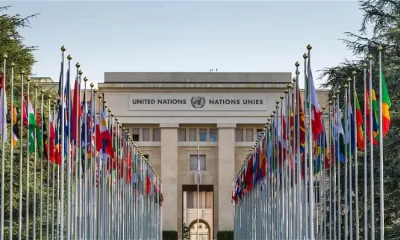Global Issues
Federation Council Holds Political Dialogue with Somalia, South Africa and Uganda -By Kestér Kenn Klomegâh
Somalian Abdi Hashi Abdullahi, South African Paul Mashatile and Ugandan Jessica Alupo, in their speeches, maintained that symbolic trend during the sessions at the Federation Council. Somali, South Africa and Uganda further underscored commitment to deepening interparliamentary cooperation and Russia’s unique roles their economic development, provision of social infrastructure, transfer of technology and training of specialists for various sectors.

The Federation Council, which is Russia’s upper chamber of legislators, continues to show its highest commitment to the principles of parliamentary democracy and political dialogue with African countries. The Federation Council has supported economic developments to sustain the fast growing population in the continent. As part of its steps to show these bilateral sentiments, the Federation Council Speaker, Valentina Matvienko, and heads of Committee on Defence and Security; Committees of Economic Policy, Committee on Foreign Relations; Committee on Science, Education and Culture; and Groups on Interparliamentary Cooperation recieved and interacted with high-level African delegations during the second quarter of 2025.
The Federation Council, during that second quarter 2025, at separate times, held working meetings with Speaker of the Senate of the Federal Parliament of the Federal Republic of Somalia Abdi Hashi Abdullahi, with Vice President of the Republic of South Africa Paul Mashatile, and with Vice President of the Republic of Uganda Jessica Alupo, who were accompanied by their delegations.
At such meetings, Africans usually note with sincere gratitude Russia’s unwavering support of traditionally friendly ties, and further underline Soviet’s assistance for the liberation of Africa from colonial rule, attainment of independence and establishment of their statehood and sovereignty.
Somalian Abdi Hashi Abdullahi, South African Paul Mashatile and Ugandan Jessica Alupo, in their speeches, maintained that symbolic trend during the sessions at the Federation Council. Somali, South Africa and Uganda further underscored commitment to deepening interparliamentary cooperation and Russia’s unique roles their economic development, provision of social infrastructure, transfer of technology and training of specialists for various sectors.
Abdi Hashi Abdullahi explained that the Republic of Somalia is yet to stabilise its political situation and carry out constitutional amendments, with the outcome contingent upon achieving nationwide reconciliation between the adversarial political forces. He called foran increased cooperation between Russia and Somalia across various fields, including interregional ties and education. On the youth agenda, highlighting the importance of young people in both countries learning more about Russia-Somalia friendship.
Matvienko described Abdi Hashi Abdullahi as an experienced parliamentarian with more than 40 years of experience behind him, “who played and continues to play one of the key roles in the formation and development of Somalia’s state system through the trials of the civil conflict in that African country. He is known for his commitment to the principles of parliamentary democracy, dialogue and national unity of Somalia.”
Matvienko noted that Somalia seeks to revive and strengthen its historical ties with Russia. “We acknowledge Russia’s increasing global influence and its dedication to fostering partnerships grounded in mutual respect and shared prosperity. There is significant potential for renewed cooperation between our nations, particularly in trade and education.We see tremendous potential to build a partnership that benefits both countries,” she underlined.
“Trust and mutual respect have always been key characteristics of the bilateral relations between Russia and South Africa. We are interested in expanding our mutually beneficial cooperation, especially in the economy and investment,” Matvienko said during her meeting with Vice President of the Republic of South Africa Paul Mashatile. The conversation took place on the sidelines of the 28th St Petersburg International Economic Forum.
Relations with African nations, including South Africa, are among Russia’s top foreign policy priorities. South Africa always considers Russia as a reliable partner, both are staunch members of BRICS. As well-known, South Africa and Russia have common political trust and multifaceted partnership forged in the joint struggle against apartheid.
As part of the working visit to Russia, his first as Vice President of South Africa, Paul Mashatile held meetings with the President of Russia, Vladimir Putin; Prime Minister, Mikhail Mishustin and Russian business leaders. According to Paul Mashatile, South Africa and Russia have maintained a productive and practical dialogue over the years, consistently exchanging experience, strengthening diplomatic ties, and expanding cooperation both bilaterally and multilaterally. “We intend to continue enhancing cooperation in the economy, investment, and trade. It is essential to promote mutually beneficial relations for the future,” he stated.
During the working visit, Vice President of the Republic of Uganda Jessica Alupo also addressed the senators of the Federation Council of Russia. Jessica Alupo expressed her gratitude for the opportunity to speak from the Federation Council rostrum and noted that the warmth of the reception testifies to the friendship between Russia and Uganda.
According to Jessica Alupo, the two countries have been establishing a high level of cooperation in such areas as technology, education, trade, tourism, investment and cultural exchanges. She made reference to Russia’s supporting the candidature, Uganda became finally a partner state of BRICS+ (Brazil, Russia, India, China and South Africa).
She reminded the time-tested friendship between Russia and Africa based on mutual respect, trust and solidarity. She expressed the hope that a partnership based on equality and mutual understanding would help Africa achieve the goals of sustainable development and added that Uganda was looking forward to the third Russia-Africa summit, and hoping for the continuation of harmonious relations with Russia.
Jessica Alupo reaffirmed her country’s commitment to cooperation with the Russian Federation in resolving global challenges in the modern world. She shared her views with the Russian legislators regarding the future of Russian-African cooperation and the role of the Russian Federation on the international stage.
On her final part, Federation Council Speaker Valentina Matvienko praised the positive attitude toward fostering friendly relations with Russia, further emphasised that “Russia is committed to expanding its traditionally friendly links with African partners,” noting that the past Russia-Africa summits have established new vectors of cooperation, including between parliaments. “Russian senators are open to cooperation and dialogue, ready to share experience and coordinate views on key regional and global issues at international platforms,” Matvienko said.
The Federation Council Speaker proposed establishing cooperation between specific committees and within the group on contacts with the parliaments of African countries. She also encouraged expanding contacts on the sidelines of international parliamentary platforms. Matvienko expressed confidence that the delegation’s visit would contribute to a better understanding of the processes in Russia, facilitating interparliamentary cooperation and broadening the scope of bilateral interaction.
Generally, Africa has historical roots from the time of the Soviet Union. The Soviet Union showed generosity and solidarity, which remains in the memory of African people. Sharing that common ground, the parties highlighted their aligned approaches to global development issues, which enable effective collaboration within the Group of 20, as well as at the United Nations, BRICS and other international platforms. The parties praised the high level of bilateral interparliamentary relations and emphasised the focus on their consistent expansion in the subsequent years.
—










